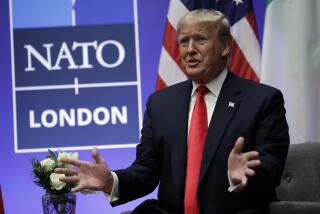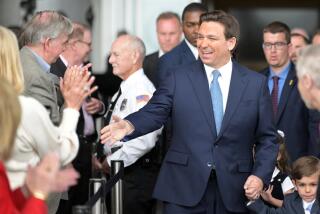Condemning the conflict, in two tones
- Share via
WASHINGTON — John McCain and Barack Obama both condemned Russia’s escalating assault on its pro-United States neighbor of Georgia. But the candidates used somewhat different tones Monday to address the fast-changing conflict that could present major challenges to the next president.
McCain, a Republican senator from Arizona, lashed out at Russia’s “path of violent aggression” and warned of “severe, long-term negative consequences” for U.S.-Russia ties.
Obama, an Illinois Democrat, also called for an end to Russian hostilities. But he tempered his comments, saying: “We seek a future of cooperative engagement with the Russian government and friendship with the Russian people.” He said Russia could play its “rightful role as a great nation -- but with that role comes the responsibility to act as a force for progress.”
The contrasting tenor of their statements came as aides to both presidential candidates scrambled to reconfigure their policies toward Russia -- reckoning with a war that, analysts said, marked a major turning point in the already tense relationship between Russia and the United States.
Advisors to both campaigns acknowledged that, no matter who wins the Oval Office, the next president will face even greater challenges in fixing what both candidates have called a flawed foreign policy under President Bush.
“Both candidates recognize, I’m sure, that this means they will confront an entirely different strategic map of Europe and central Asia than they anticipated,” said Richard Holbrooke, a former United Nations ambassador under President Clinton who recently began advising the Obama campaign. “That’s because Russia changed the rules of the game.”
For McCain and Obama, the war in Georgia has forced a pivot in a campaign where the foreign policy debate has focused primarily on the Middle East and terrorism.
The issue poses challenges for both as they balance the need to condemn Russia’s actions while addressing the reality that the next administration will need Moscow’s assistance in confronting potential nuclear threats from Iran and North Korea.
McCain had sought to highlight his support for U.S.-Russia cooperation on nuclear security issues, delivering a major address in May in which he declared that “Russia and the United States are no longer mortal enemies.”
McCain used that address as a public break from Bush’s unpopular foreign policy, embracing a new treaty with Russia and other efforts to reduce the number of nuclear weapons.
But in recent days McCain has signaled that he intends to focus more on hard-line criticism of Russian Prime Minister Vladimir V. Putin and his government.
Obama too faces challenges as he tries to stake out a more conciliatory foreign policy that includes his willingness to negotiate with enemies.
His softer language toward Moscow leaves him open to criticism at a time when the U.S. is clearly aligned with Georgia, an emerging democracy. But Obama aides say this, in fact, can be an advantage.
“There is a fundamental difference, which is Sen. McCain wants to isolate Russia, and he thinks that is a way to change their behavior,” said Stanford University professor Michael McFaul, an Obama advisor on Russia.
Aides to both candidates said Monday that each had been focused behind the scenes for months on the growing tensions between Georgia and Russia.
McCain, aides said, has been in regular contact for years with Georgian President Mikhail Saakashvili, and has traveled on several occasions to Georgia, even visiting the separatist region of South Osettia in 2006.
In April, after Putin forged stronger ties with separatist leaders, he called Saakashvili.
Obama advisors said that the Illinois senator had been involved, as well, saying in April that Georgia must “resist the temptation to be drawn into a military conflict.”
As Obama traveled to Hawaii on Friday for a vacation, he issued a brief but bland statement calling on Georgia and Russia to “show restraint.”
By Saturday he had spoken with the Georgian president and condemned Russia’s “aggressive actions.”
--
More to Read
Get the L.A. Times Politics newsletter
Deeply reported insights into legislation, politics and policy from Sacramento, Washington and beyond. In your inbox twice per week.
You may occasionally receive promotional content from the Los Angeles Times.










